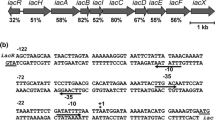Abstract.
Transcriptional activity was monitored in cells of the Antarctic psychrotrophic bacterium Pseudomonas syringae (Lz4W), which does not grow above 30°C. It was observed that the bacterium was capable of synthesising RNA at a temperature range of 0–37°C, both in vitro and in vivo. The net incorporation of the radioactive precursor, [3H]uridine, into RNA was found to be affected at 37°C. A pulse-chase experiment following a 32P labeling of RNA in vivo indicated that the ribosomal RNAs (rRNAs) degrade faster at and above 30°C. It was also found that the increased ribonuclease (RNase) activity at high temperature might be responsible for this degradation. The attack on ribosomal RNAs by RNase took place after their assembly into ribosomal particles. It is suggested that the degradation of rRNAs at supraoptimal temperatures might be a detrimental factor for growth above 30°C.
Similar content being viewed by others
Author information
Authors and Affiliations
Additional information
Received: 29 July 1998 / Accepted: 25 September 1998
Rights and permissions
About this article
Cite this article
Ray, M., Sitaramamma,, T., Kumar, G. et al. Transcriptional Activity at Supraoptimal Temperature of Growth in the Antarctic Psychrotrophic Bacterium Pseudomonas syringae . Curr Microbiol 38, 143–150 (1999). https://doi.org/10.1007/PL00006778
Issue Date:
DOI: https://doi.org/10.1007/PL00006778




